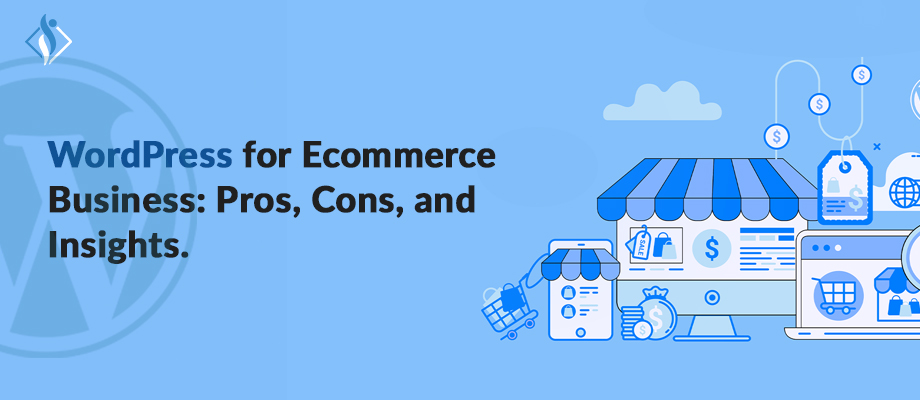Home » WordPress Development » WordPress for Ecommerce Pros and Cons: A Comprehensive Guide
WordPress for Ecommerce Pros and Cons: A Comprehensive Guide

If you’re thinking about selling things online, you might have heard about WordPress. It’s like a strong foundation for websites and blogs. But here’s the cool part; it’s also really good for making online shops! So, why is WordPress good for an ecommerce business? Well, it’s like having a super easy way to manage your stuff and show it to people.
You can add special tools to make your online shop look nice and work smoothly. But, just like anything, there are a few things to watch out for, like keeping things safe from bad folks. Remember, even with a couple of tricky bits, using WordPress can help your online shop do great things! Let’s explore the blog to learn more.
10 Pros of using WordPress for Ecommerce
Using WordPress for eCommerce, especially with plugins like WooCommerce, offers several advantages. Here are some of the pros of using WordPress for eCommerce:
- User-Friendly Interface: WordPress is known for its intuitive and user-friendly interface, which makes it easy for users, even those without technical expertise, to manage and update their online store.
- Affordable: The WordPress platform is open-source, so it costs nothing. While there might be costs associated with hosting, premium themes, or plugins, it’s generally more affordable than other dedicated eCommerce platforms.
- Flexibility: With thousands of plugins and themes available, WordPress allows for a high degree of customization to cater to specific business needs.
- SEO Friendly: WordPress is built with search engine optimization in mind. With the right plugins, like Yoast SEO, Rank Math SEO, it becomes even easier to optimize your eCommerce site for search engines.
- Large Community Support: Being one of the most popular CMS platforms, WordPress has a vast community. This means a plethora of forums, tutorials, and developers are available to help you out.
- Scalability: As your business grows, WordPress is capable of handling increased products and traffic, ensuring your site performs well as it scales.
- Integration Capabilities: WordPress can be integrated with various third-party tools and platforms, including email marketing software, payment gateways, and CRM systems.
- WooCommerce: Specifically designed for WordPress, WooCommerce is a powerful and free eCommerce plugin that allows you to sell anything, beautifully.
- Multilingual: With plugins like WPML, you can easily set up a multilingual eCommerce site to cater to a global audience.
- Easy Analytics Integration: Easily link platforms like Google Analytics to WordPress, giving you valuable insights into your site’s activity and customer preferences.
While WordPress offers numerous advantages for eCommerce, it’s essential to consider your specific business needs, budget, and technical expertise when deciding if it’s the right platform for your.
5 Cons of using WordPress for Ecommerce
While WordPress offers many advantages for eCommerce, it also has its drawbacks. Here are some of the cons of using WordPress for eCommerce:
- Regular Maintenance: WordPress, along with its themes and plugins, needs regular updates. It is possible for security vulnerabilities and features to become broken if you fail to update.
- Performance Issues: As your online store expands, you might experience slowdowns. It’s vital to select the right hosting service and keep your plugins updated to ensure smooth operations.
- Learning Curve: If you’re new to WordPress, there’s a bit of a learning curve. Grasping the intricacies, especially for eCommerce functionalities, might take some time.
- Backup and Recovery: Every online store should have regular backups. While there are tools to assist, it’s an additional task that you’ll need to oversee.
- PCI Compliance: If you’re handling credit card information directly on your site, ensuring PCI compliance is your responsibility, which can be complex.
What is Ecommerce functionality in WordPress?
WordPress offers robust ecommerce capabilities, especially with tools like WooCommerce. This allows users to transform their sites into efficient online marketplaces. Features range from product displays to secure transactions, catering to both digital and physical sales. It’s a user-friendly solution, ideal for emerging entrepreneurs seeking a professional online presence.
Which are WordPress Ecommerce Site Alternatives
While WordPress is a popular choice, several other platforms cater to e-commerce needs:
- Shopify: A dedicated ecommerce platform, Shopify offers a host of built-in features suitable for online selling.
- Magento: Known for its scalability, Magento is ideal for large-scale online stores.
- BigCommerce: A cloud-based solution, BigCommerce offers a range of customizable templates for ecommerce businesses.
What is an Ecommerce Plugin in WordPress?
WordPress offers a variety of tools to enhance online selling. Among the best e-commerce plugins, WooCommerce is a standout, seamlessly integrating with WordPress to turn websites into online stores. Alternatives like Easy Digital Downloads cater to digital sales, while WP Ecommerce has its distinct features. While WooCommerce is often the preferred choice, other plugins provide specialized solutions, ensuring a tailored e-commerce experience for all.
6 Things to know before using WordPress for Ecommerce
If you’re considering using WordPress for eCommerce, it’s essential to be well-informed before diving in. There are a few things you need to know:
- Understand the Difference Between WordPress.org and WordPress.com: WordPress.org is a self-hosted platform, giving you full control over your site. In contrast, WordPress.com is a hosted service with limitations, especially for eCommerce.
- Security is Paramount: Implement security measures like SSL certificates, security plugins (e.g., Wordfence or Sucuri), and regular updates to protect against potential threats.
- Optimize for Speed: Slow-loading sites can deter customers. Use caching plugins, optimize images, and minimize scripts to ensure your site loads quickly.
- Mobile Optimization is Crucial: Many users shop on mobile devices. Ensure your theme is responsive and test your site on various devices to ensure a seamless shopping experience.
- SEO is Vital: An eCommerce site needs traffic to generate sales. Use SEO plugins like Yoast SEO and follow best practices to optimize your site for search engines.
- Regular Updates: WordPress regularly releases updates, ensuring that the platform remains secure and up-to-date with the latest web standards.
Get your E-Commerce business off the ground with a website
Considering a leap into the digital commerce realm? WordPress offers a robust platform tailored for your ecommerce needs. By collaborating with a renowned WordPress ecommerce development company, you can harness the power of cutting-edge tools and expertise. Elevate your brand, enhance user experience, and drive sales. Make the smart move; contact us today and embark on a transformative ecommerce journey!
I'm currently a WordPress developer at Samarpan Infotech. My interests include Web Development. In my spare time, I enjoy reading and surfing the internet.



